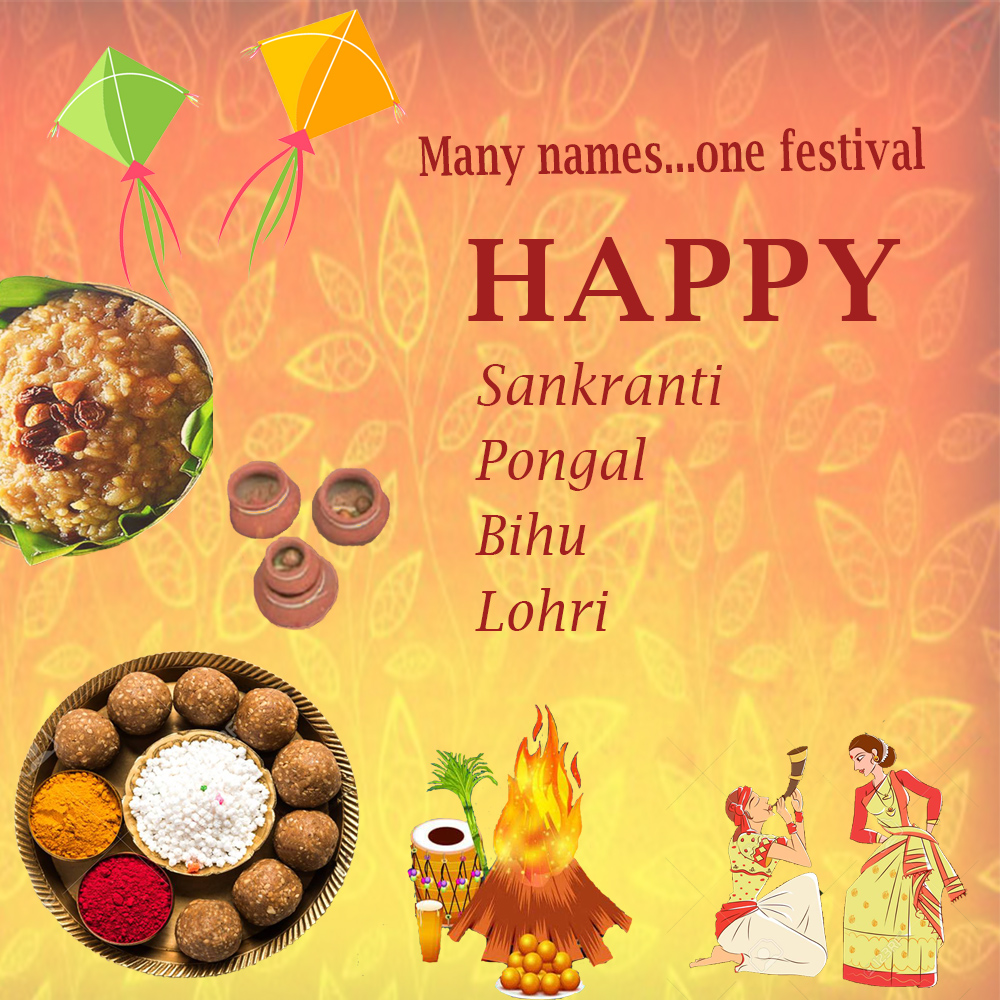Many names…..one festival ‘Makar Sankranti’
Makar Sankranti is celebrated with immense zeal across India, with unique regional customs and traditions, but the underlying theme of celebrating the harvest season, expressing gratitude, and the Sun’s journey remains universal.

Here’s the detailed explanation of the different regional names and customs of Makar Sankranti in India:
1. Pongal (Tamil Nadu)
- Date: 14th January
- Importance: Pongal is a four-day harvest festival, particularly significant in Tamil Nadu. It marks the end of the winter solstice and celebrates the Sun’s northward journey. The second day of the festival, Thai Pongal, is the most important.
- Special Customs: On Pongal day, a traditional dish, also called Pongal, is prepared using freshly harvested rice, lentils, and jaggery. The dish is offered to the Sun god. People decorate their homes with kolams (floor patterns) and celebrate with family gatherings and prayers.
2. Makar Sankranti (Maharashtra, North India, Gujarat)
- Date: 14th January
- Importance: Makar Sankranti is one of the most celebrated festivals in Maharashtra, Gujarat, and North India. It marks the beginning of the harvest season, and people express their gratitude to the Sun god for providing warmth and energy for the crops.
- Special Customs: Kite flying is a prominent activity in Gujarat and Maharashtra. People also exchange sweets made of til (sesame) and jaggery (gul). The festival is marked by bonfires and vibrant celebrations.
3. Lohri (Punjab, Haryana)
- Date: 13th January
- Importance: Lohri is a harvest festival in Punjab and Haryana, dedicated to the Sun god. It marks the end of winter and the beginning of the harvest season for rabi crops like sugarcane. The festival is also a way of giving thanks for the harvest.
- Special Customs: On Lohri, large bonfires are lit in open fields or in the front yards of homes. People gather around the fire, dance the Bhangra and Gidda, and sing traditional folk songs. Offerings of sugarcane, sesame seeds, and jaggery are made into the fire.
4. Bihu (Assam)
- Date: Mid-January
- Importance: Bihu marks the beginning of the harvesting season in Assam and is one of the most important festivals in the state. It coincides with Makar Sankranti, celebrating both the harvest and the Sun’s movement into Capricorn.
- Special Customs: People perform traditional dances like Bihu dance, enjoy festive foods, and visit relatives and friends. The festival is spread across three days, with the first day dedicated to worshipping cattle and the second day marking the harvest.
5. Khichdi (Uttar Pradesh, Bihar)
- Date: 14th January
- Importance: In Uttar Pradesh and Bihar, Makar Sankranti is often called the Khichdi festival because of the dish prepared on this day. The festival is associated with the Sun god and is a time for thanksgiving for the harvest.
- Special Customs: People gather around holy rivers like the Ganges, take ritual baths, and prepare Khichdi (a dish made from rice and lentils) as a symbol of purity and good health.
6. Uttarayan (Gujarat)
- Date: 14th January
- Importance: Uttarayan is the most popular festival in Gujarat, where people celebrate the northward journey of the Sun. The day is celebrated with much fanfare, particularly through kite flying, which is a significant tradition in Gujarat.
- Special Customs: People go out on rooftops to fly kites. The skies are filled with kites of various sizes and colors. Undhiyu, a traditional mixed vegetable dish, is prepared, and sweets like chikki (made of jaggery and peanuts) are shared.
7. Makara Sankranti (Karnataka)
- Date: 14th January
- Importance: In Karnataka, Makara Sankranti is celebrated with fervor and marks the end of the winter season. People believe that the day is auspicious for both spiritual and material prosperity.
- Special Customs: People worship the Sun god, and tilgul (a mix of sesame and jaggery) is exchanged as a gesture of goodwill. People also prepare traditional foods like puran poli and vangi bath.
8. Sankranti (Andhra Pradesh & Telangana)
- Date: 13th/14th January
- Importance: Sankranti is one of the most celebrated festivals in Andhra Pradesh and Telangana, marking the harvest of new crops. It is a time of joy and community bonding.
- Special Customs: The festival spans three days, with the first day being Bhogi, a day to clean and discard old items and celebrate new beginnings. The second day is Sankranti, and the third day is Kanuma, a day dedicated to livestock.
9. Maghi (Himachal Pradesh)
- Date: 14th January
- Importance: Maghi marks the transition of the Sun into Capricorn and is an important festival in Himachal Pradesh. It is considered a time for spiritual renewal and purification.
- Special Customs: People take ritual dips in rivers and visit temples to offer prayers. Traditional foods like siddu (a type of steamed bread) are prepared and shared with friends and family.
Significance of Makar Sankranti:
- Astronomical Significance: The festival marks the day when the Sun enters Capricorn (Makar rashi), signaling the end of the winter solstice and the beginning of longer days.
- Agricultural Significance: Makar Sankranti celebrates the harvest of rabi crops, and it’s a time to express gratitude for the bountiful harvest.
- Cultural Significance: The festival promotes social bonding and community celebrations. It encourages good health, prosperity, and positive energy through rituals, prayers, and festive activities like flying kites and cooking traditional dishes.
- Spiritual Significance: The festival is also about spiritual renewal, with people taking holy dips in rivers and praying to the Sun god for health and prosperity.
You must be logged in to post a comment.